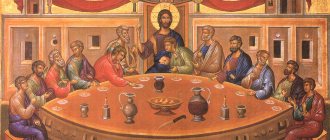After every prayer proclaimed in church or at home, Orthodox Christians say the word “Amen.” But the fact that this word is constantly proclaimed does not mean that everyone knows and understands its true meaning, repeating it simply mechanically. If you study dictionaries more carefully and find the rules for using this word, you can say that it is pronounced in several cases and has an important symbolic meaning.
In Dahl's dictionary
adv. church truly, verily, truly, faithfully and firmly. The people turned amen into a noun, meaning either a prayer or the end of the matter. Amen, amen, scatter, talk. evil spirits. Amen saves a person. Amenem does great things. Amen does the trick. Amen is not great in writing, but it gets the job done. One word - Amen, and he does holy deeds. No matter how much you sing. and give an amen. Amen cannot be used to knead the dough: say prayers and add flour. Amenem is not to accomplish things, that is, with words and promises alone. Amen to that matter; the whole thing is amen, end. The Tatar also knows Amen in his prayers. If you don’t say amen, we won’t give you a drink, without prayer. Amen, amen - and head to the barn, dissolute prude. It won't come from Amen. Amen will not get rid of the demon. I came to Amen, to the end of the matter. Give someone an amen, decide, destroy. It crumbled like a treasure from the amen, the thing disappeared in my eyes. Pray and be baptized: here is an amen to you. Is there anyone to give Amen to? Is there anyone in the hut who is schismatic? Amen, don’t go alone, a strict prohibition, a command.
Some more important information about the word “amen”
The word “amen” is a term common not only in Christianity, but also in Islam and Judaism; it confirms the truth and indisputability of what has been said, and therefore is proclaimed after prayers, reading the Holy Scriptures, and also during services. In the Bible, this word appears for the first time in the Third Book of Kings, and it was also used as the end of solemn oaths.
The word “Amen” was the people’s response to the words spoken by bishops and priests during the Divine Services, which meant the agreement of the faithful with all the proclaimed truths. If we delve even deeper into the essence and history of this word, then it is worth saying this about it:
- in the New Testament the word “amen” appears 119 times;
- 52 times this word was used in a meaning unknown to the Jewish Holy Books;
- the word "amen" became a very important liturgical term;
- the term means that praying Christians agree with the Will of God, fully accept it, and are responsible for observing God’s Commandments;
- By saying the word “Amen” after prayer, Christians express their hope that it will be heard by the Lord;
- if a Christian says “Amen”, this means that he understands the words of prayer or Holy Scripture, fully accepting them.
The last word in the Revelation of St. John the Theologian is precisely “Amen,” once again confirming that everything written is true and truthful.
In the services of the Orthodox Church, it is the word “amen” that is most often used, since it denotes complete agreement with all the texts of the Holy Scriptures and their reliability. This word has an important meaning for Christians, so they constantly say it after prayers, fully agreeing with God's Will and expecting his blessing.
Yes, the word “amen” began to be actively used in various phraseological units and phrases, but it is directly related to the Bible, being used as a confirming fact of everything written and proclaimed. The word “amen” is like a seal confirming the authenticity of God’s laws and Biblical truths, which is why it is very often used by Orthodox Christians.
What language did this word come from?
From Hebrew, and its pronunciation in our language has hardly changed. In ancient times it sounded like "Amen" (with the emphasis on the second syllable). Interestingly, modern Western branches of Christianity (for example, Catholicism) have slightly changed this word - their priests and believers pronounce it, placing the emphasis on the first syllable.
Find out what awaits you today - Horoscope for today for all zodiac signs
There are two theories for translating the word “Amen”:
- It means “all is true,” “truly,” or “so be it.” That is, this is the logical ending of a sermon or prayer, “sealing” everything that was said earlier.
- This is one version of the word "AUM", which is known to very few Christians. It means confirmation of Divine Being, that is, the One Divinity contained in all living things (including you and me). According to this theory, saying “Amen” needs to cleanse and “brighten” the soul as much as possible, because this word can awaken that part of our nature that is as close as possible to the Creator.
It is interesting that in the Jewish language the following words are considered related to it: “believe” (“trust”), “reliable” (“solid”, “constant”).
What does "Amen" mean in the New Testament
The word “amen” is used frequently in the New Testament (more than 100 times). Its meaning is somewhat different from the Old Testament. Jesus Christ began his speech with this word several times. It meant “Truly I tell you.” At the same time, the word “amen” retained its meaning as the response of a praying people to praise, blessing, praise, and prophecy.
It also began to be used at the end of a text. In Revelation from John the Theologian (3:14), a new meaning of the word “amen” appears. In terms of meaning, this is the name of Jesus, since “all the promises of God are in Him “yes” and in Him “Amen,” to the glory of God through us” (Second Epistle of the Apostle Paul to the Corinthians, 1:20).
Pronouncing “Amen” to yourself after reading Surah “Fatihah” in prayer
“Ignorance, paganism and delusion, the sects “Akku”, “Ata Zhol”, “Sufis” who worship graves and ask the dead for help at their mazars and mausoleums in Turkistan, Bulgar, the Caucasus and the CIS countries, from the point of view of Islam "
Prayer (dua) to Allah is worship that the Almighty ordered us to perform. Its enormous role is revealed in many hadiths. 1. Hadith: An-Nugman ibn Bashir, may Allah be pleased with him, said that the Prophet, peace and blessings of Allah be upon him, said: “Prayer is worship.” (Ahmad, al-Bukhari, at-Tirmidhi, Ibn Majah, Abu Dawood; reliable hadith)
Commentary: The Hanafi scholar Imam Mula al-Qori in his book al-Mirkot, as well as the Hanafi scholar Imam Azim Abadi, in his book Bazlul Majgud, wrote an interpretation of this hadith and said: “ad-duga wal gibada is the greatest worship. And if a person goes to the graves and asks for the dead, this act will be considered polytheism for him.”
2. Hadith: from Abdullah ibn Masud, may Allah be pleased with him, who said: “O Messenger of Allah! What is the greatest sin? The Prophet (peace and blessings of Allaah be upon him) answered: “This is when you give Allah an equal (companion), while He created you” (Bukhari, Muslim) Commentary: The Hanafi scholar Imam Mula Ali Qori, in his book al-Mishkat says : that the greatest sin is that you know that Allah created you and after that you will not cry to Allah asking for help, for salvation, for protection not from Him; Also, the famous Hanafi scholar Al-Kandalawi, in his book al-Taghliku Sabif in volume 1, 50-51 pages, says: Shirk (polytheism) is a great sin when a person experiences grief, misfortune, and he immediately goes to the graves of to the dead in order to save himself from this harm and remove the pain and grief that befell him “As the Prophet sallallaahu 'alaihi wa sallam said, this is polytheism.” 3. Hadith Qudsi: reported from the words of Abu Zarra al-Ghifari, may Allah be pleased with him, that the Prophet (PBUH) reported that his Almighty and Great Lord said: “O My servants, verily, I have forbidden injustice to yourself and made it forbidden between you, so do not oppress each other! O My servants, all of you (were) lost, except those to whom I showed the right path, so ask Me to guide you to the right path, and I will guide you! O My servants, all of you will remain hungry, except those whom I feed, so ask Me to feed you, and I will feed you! O My servants, all of you will remain naked, except those whom I clothe, so ask Me to clothe you, and I will clothe you! O My servants, truly, you sin night and day, but I forgive all sins, so ask Me for Forgiveness, and I will forgive you! (Muslim). Comment: the famous Hanafi scholar Imam ar Robati, in his book al - Kowakibul Adduriya, which is famous in the madhhab of Abu Hanifa. This book also says: that a person needs Allah every second. And when something happens to him, grief or trouble, he should turn only to Allah. And not like a person who goes to the graves of the dead (dead) and turns to them with requests. They who are deceased cannot help him in this world. And all these actions are shirk and sin.”
4. Hadith: It is reported that Ibn Abbas, may Allah be pleased with him, said: “Once when I was sitting on horseback behind the Prophet (peace and blessings of Allaah be upon him), he said: “O boy, I will teach you a few words: Remember Allah , and He will protect you, remember Allah and you will find Him before you. If you want to ask for something, ask Allah, if you want to ask for help, turn to Allah for it. And know that if all people come together to do something useful for you, they will benefit you only in what has been predetermined for you by Allah, and if they come together to harm you, they will harm you only in what was ordained for you by Allah, for the pens have already been raised and the pages have already dried.” (Hadith narrated by Imam Ahmad, at-Tirmidhi sahih). Comment: The Hanafi scholar Imam Mula al Qari, in the book al Mirkot fi sharhi al Mishkat, interpreting the context of the above hadith from ibn Abbas, says: “What we see today at the graves, mazars, what is happening, people go to them and ask for the dead , the dead, about help, about salvation and forgiveness, all their actions contradict this hadith and are polytheism, innovation and kufr. These actions need to be refuted, stopped and explained to people that what you are doing is not in Islam”; And the Hanafi scholar Sheikh Maksum al-Khujandi, in the book “Hukmullahi Wahidu Somad,” and the Hanafi scholar Imam al-Lusi, in the books, “Goyatul Maani,” Fathul Maan,” Ruhul Maani and others, also interpreted the context of this hadith, saying: “ This hadith proves that asking for help and salvation from dead people is polytheism, a great sin and an innovation.”
5. Hadith: from Abu Hurayrah, may Allah be pleased with him, that the Prophet sallallaahu 'alaihi wa sallam said: “Our Almighty Lord descends every night in the last third of it to the lower sky and says: Whoever asks Me for anything, so that I could give him this? Who will ask Me for forgiveness so that I can forgive him? Who will call upon Me so that I may answer him?” (Bukhari, Muslim)
Comment: in this topic, the Hanafi scholar Imam al-Lusi says: “This hadith (radd) is a refutation to those kuburites (grave worshipers) who, if something happens, immediately rush to the graves of the deceased for help, their act is shirk (polytheism) and contradicts this hadith."
6. Hadith: from Abu Hurayrah may Allah be pleased with him that the Prophet (peace and blessings of Allaah be upon him) said: “Seek help from Allah and never give up” (Muslim)
Comment: The Hanafi scholar Imam ar-Rustami, in his book at-Tibiyan, explaining this hadith, says: “When a person wants to demand help, salvation, protection, he must turn to Allah. He cannot go to the graves of the dead (deceased), no matter who they are.”
7. Hadith: from Abu Hurayra may Allah be pleased with him, “The Prophet sallallaahu 'alaihi wa sallam said: “Allah is angry with the one who does not ask Him” (Ahmad, “Adab al-Mufrad” al-Bukhari, at -Tirmidhi, ibn Majah). Comment: The Hanafi scholar Imam Faidullahi ay-Jeylani, in his book “Faidullahi Somad”, gave an interpretation of this hadith; he has 1 volume book Sharh “Adab al Mufrad” al Bukhari, in which he made an interpretation. Explaining this hadith, he says: “The greatest Farz is dua (supplication), a person needs to turn to Allah with a prayer, he must call on the Almighty, and if he leaves the prayer (arc) and does not ask Him, simply sitting at home he will remain silent , the punishment for this act is the wrath of Allah. And what can we say about a person who leaves Allah and then goes to graves, mazars and asks for aruakhs and other dead people, then what will happen to such (a person) Auzu-Billah!
8. Hadith: From Salman al-Farsi may Allah be pleased with him that the Messenger of Allah (peace and blessings of Allah be upon him) said: “Truly your Lord is Generous and Shy, and when His slave stretches out his hands to Him (asks Him), He be ashamed to leave them empty" (Sunan Abu Dauda, Ibn Hibban, Ibn Majah, Tirmidhi, Hakim, Bayhaki, Ahmad and others.)
Commentary: The Hanafi scholar Imam Mula al-Qori, in the book of al-Mirkot, as well as the Hanafi scholar Sheikh al-Ghunaimi al-Maidani, in the book Sharh Aqida Tahawiyya, in which he made the sharh, they interpreted this hadith and said in the same way: “ This hadith proves that the person who leaves Allah acts unreasonably, because the Almighty promises and will not just leave you, if you ask the Almighty, He will grant it to you. Allah is embarrassed to leave you with nothing, but you leave Him and go to graves, mazars and ask for aruahs (the dead), this act is contrary to Shariah.”
9. Hadith: A good proof from the Sunnah that the dead do not have any opportunities in this life and do not have any knowledge of the unseen is the hadith from the collections of Bukhari, Muslim: The Prophet, may Allah bless him and grant him peace, said: “At the judgment day, many Muslims will not be allowed to approach the reservoir of the Prophet, peace and blessings of Allah be upon him. Seeing this, the Messenger of Allah (peace and blessings of Allah be upon him) will ask the angels guarding the reservoir: This is my ummah, Muslims. Why don't you let them in? To which the angels will answer: O Muhammad! you don’t know what they did after you.”
Comment: The Hanafi scholar Imam Taftazani, in his book Sharhul Maqosit in volume 5, says: “that dead people do not hear us and we do not hear them. There is no disagreement between our scholars (of the madhhab of Imam Abu Hanifa) on this topic. This afterlife (barzakhiya), Allah Himself knows best!
Hadith: The Messenger of Allah, may Allah bless him and grant him peace, said: “There is no god but You! Glory to You! Truly, I was one of the unjust!” This is the prayer of my brother Yunus, and whenever someone in trouble turns to Allah with this prayer, He will certainly deliver him from this trouble.” (Ahmad, Tirmidhi, An-Nasai). Making a prayer to Allah will benefit a Muslim regardless of whether he is given an answer or not, for if Allah the Almighty, glory to Him, for reasons known to Him, does not answer the one who calls with a prayer during a person’s life, in return He will give him a reward in the eternal world , and the Prophet (peace and blessings of Allaah be upon him) said: “Whoever among the Muslims turns to Allah with a prayer for something in which there is nothing sinful and which does not (cause) the severance of family ties, Allah will certainly grant him one of three: either his prayer will be answered (already in this life), or He will make it a reserve for (man) in the eternal world, or He will turn away from him evil equal (in magnitude to what he asks for).” (The people) said: “Then we will (turn to Him with prayers) more often!” The Prophet (peace and blessings of Allaah be upon him) said: “And Allah will give you more (of what you ask for).” (This hadith is reported by Abu Dawud, at-Tirmidhi and Ahmad).
Texts and comments to the book “Creed of at-Tahavi 1. Allah is one and He has no partners. Commentary: The meaning of the word "tawhid" means "one", "to be in the singular." According to Muslim belief, termir “tawhid” means that only Allah Almighty is worthy of worship and that He has no partners. None of His creatures can compare with Him, cannot interfere in His affairs, they have nothing in common with Him in omnipotence, strength and qualities. Tawhid is the basis of faith, this is the most important goal of the mission of the prophets (Peace be upon them!). Allah Almighty says: “(O prophet!) We did not send a single messenger before you who was not inspired: “There is no god but Me. Worship Me!” - we testify (Anbiya, 25). Therefore, the greatest sin is to associate partners with Allah. If a person goes into the afterlife with such a grave sin without proper repentance, he will be worthy of the eternal fire of hell. Allah Almighty says: “Verily, Allah does not forgive when partners are associated with Him, but He forgives all other (less serious) sins to whom He wishes. And whoever associates partners with Allah commits a great sin” (An-Nisa, 48:116).
61. We do not say about any Muslim who turns his face to the Kaaba when praying because of his sins that they are unbelievers if they do not consider it right, and we do not tell the believer that the sins he has committed will not harm him. (We do not consider any of the people of our Qibla to be an unbeliever because of some sinful action committed by him, until he considers this action permissible. We do not say that the sin of a person who has faith does not have a harmful effect on him).
Comment: Whatever Muslim commits a sin, we do not consider him an unbeliever. It’s another matter when he considers what is forbidden to be permitted. And we are not saying that a believer will not be influenced by the sins he has committed. The Messenger of Allah (peace and blessings of Allah be upon him) said: “If anyone says to his Muslim brother: “You are an infidel!”, then even if such a thing comes true (from this word), one of them will suffer. And if this does not happen (that is, if he does not become an infidel), then this word will return to him” (Bukhari and Muslim).
90. Allah accepts prayers and requests and satisfies the needs of His creations. (Allah answers people’s prayers and gives them what they ask for). Commentary: Allah answers the prayers of his slaves and fulfills their wishes. The main thing is that the prayers comply with their conditions. Allah Almighty says: “Your Lord said: “Call upon Me and I will answer you” (Al-Ghafir, 60). Allah Almighty says: “If My servants ask you about Me, then I am close and answer the call of the person praying when he calls on Me. Let them answer Me and believe in Me, perhaps they will follow the right path” (Al-Baqarah, 186).
91. He rules over all things; no one can rule over Him. Even if such a moment arises, it is impossible that it does not need Allah. If at any time someone says that he did not need Allah, he will become an unbeliever and will be among those subjected to torture. (Allah has absolute control over everything and nothing has any control over Him. Nothing can be independent of Allah even for a blink of an eye, and whoever considers himself independent of Allah even for a blink of an eye is guilty of disbelief and becomes one of them people's death). Comment: Without the desire and will of Allah, nothing comes true. He is the owner of all creations. It is impossible to be independent from him. Even thinking about it is disbelief. Allah Almighty says: “O people! You need Allah, while Allah is Rich and Praiseworthy” (Al-Fatir, 15). (Based on comments to the book “The Creed of Al-Tahawi”)
1. Shirk is the biggest injustice. Allah says in Surah Luqman (13): “Lukman said to his son, instructing him: “O my son! Do not associate partners with Allah, for polytheism is a great injustice." As it comes in the hadith (Bayhaqi): “Allah says: “I created man, and he worships another, I give him food, and he thanks another.” 2. Shirk is the reason for deprivation of Paradise and eternal stay in Hell. Surah al-Maida (72): “Verily, whoever associates partners with Allah, He has forbidden Paradise. Gehenna will be his refuge, and the wicked will have no helpers.” 3. Shirk is the cause of corruption of all righteous deeds of a person. Surah al-Anam (88): “Such is the guidance of Allah by which He guides those of His servants whom He will. But if they had joined partners, then everything they did would have become in vain.” Or as Allah speaks about the prophets in Surah al-Zumar (65): “It has already been instilled in you and your predecessors: “If you begin to associate partners, then your deeds will be in vain and you will certainly be one of the losers.” As reported by Abu Hurayra (Muslim), the Prophet, salallahu alayhi wasallam, says: “Allah said: “Whoever does some deeds, and after that associates partners with Me, then I do not accept his deeds.” In a hadith from ibn Masud (Bukhari), the Prophet, salallahu alayhi wasallam, says: “Whoever dies while associating partners with Allah will enter Hell,” or as Jabir (Muslim) reports, the Prophet, salallahu alayhi wasallam, said: “Whoever meets Allah ( as the Messenger of Allah said in another hadith, “a person will definitely meet Allah and will stand before Him alone and answer Him without an interpreter), without associating partners with Him, he will enter Paradise, and the one who committed shirk will enter Hell " Before this meeting, a person must beware of shirk in order to be saved from Hell and enter Paradise. And for those who committed shirk, it’s time to repent and ask for forgiveness from Allah. Tawbah (repentance) is the only reason for the forgiveness of such a serious sin as shirk, and Allah accepts tawbah if it is committed during a person’s lifetime. As Anas ibn Malik reports a hadith (Muslim), in which the Prophet, salallahu alayhi wasallam, said: “Allah rejoices when he sees his slave committing tawbah - repenting of his sins. And the joy of Allah is greater than the joy of a man who found his camel in the desert with water and provisions, which even earlier, upon waking up, he did not find and had already lost his last hope of surviving. And from such joy this man did not even notice how he had made a grave mistake, thanking the Almighty for salvation, saying: “O Allah, you are my slave, and I am your master.” As it comes in a hadith from Anas ibn Malik, the Prophet, salallahu alayhi wasallam, says: “Allah says: “O son of Adam, if you worship and call on Me, trusting in Me and asking forgiveness for your sins (repenting) - I am all yours I forgive sins." (Tirmidhi) Benefit - it is never too late for a person to ask for forgiveness for sins, especially such serious ones as shirk, if he has realized his sins and mistakes, and hope for forgiveness from Allah.
Interpretation of the Holy Verses of the Qur'an by Sheikh 'Abd al-Rahman al-Sa'di. Allah Almighty says: When trouble befalls you at sea, everyone to whom you called except Him abandons you. When He saves you and brings you to dry land, you turn away. Truly, man is ungrateful. (Al-Isra, 67). Another manifestation of Allah’s mercy, indicating the need to worship Him alone, is His concern for people who get into trouble at sea. People are overcome with fear of death when they see waves colliding with each other. And then they forget all those whom they worshiped along with Allah. They forget the living and the dead, upon whom they prayed for prosperity, as if they had never turned to them for help. And this happens because the polytheists know very well that weak and helpless creatures are not able to save them from misfortune. And therefore they begin to cry out to the Creator of earth and heaven, for whose help in times of disasters and misfortunes absolutely all creations hope. They sincerely pray to Him for salvation and humble themselves before Him. But as soon as Allah saves them from trouble and brings the ship safely to shore, the polytheists forget about the one whom they recently prayed for help. They begin to associate partners with Him and worship creatures that are not capable of benefiting or causing harm, are not capable of bestowing benefits or depriving them of mercy. They refuse to sincerely serve their Lord and Master, which is a manifestation of ignorance and ingratitude. Truly, only the righteous, whom Allah has guided on the straight path, who have a sound mind and follow the straight path, respond with gratitude to blessings. Such people know that only Allah, Who delivers creations from misfortunes and saves them from misfortunes, deserves worship and sincere service in both sorrow and joy. As for people who have lost God’s support and are left alone with their weak minds, in difficult times they only think about how to get out of the current situation and get rid of trouble. And when they get rid of trouble, out of their ignorance they believe that Allah could not cope with them. At the same time, they do not even think about what awaits them in the future while living on earth, not to mention what awaits them after death.
Allah Almighty says: When you call on them, they do not hear your prayer, and even if they heard, they would not answer you. On the Day of Resurrection they will reject your worship. No one will tell you like the Knower. (Fatyr, 14). You pray to soulless stones and trees, lifeless bodies of the dead and angels who are concerned only with the worship of their Lord. They don't hear your prayers, and even if they did, they still wouldn't answer you. Even if we imagine that they hear your words and appeals, then your prayers will still not bring you any benefit, because not a single creation of the Lord has divine power. Moreover, the angels, prophets and righteous people are not happy that the polytheists call on them. On the Day of Resurrection they will renounce the polytheists and exclaim: “Glorified are You! You are our Patron, not they” (34:41) Be convinced of the truthfulness of everything that Allah has told you. Do not doubt divine revelation, because no one will reveal the truth to you the way the Lord does. Verily, He is the Knower and the Competent. These verses are irrefutable proof that only Allah is the True God, worthy of worship and deification, and that worshiping anyone other than Him is futile and will not bring any benefit to the polytheists.
Allah Almighty says: If you ask them: “Who created the heavens and the earth?” - they will certainly say: “Allah.” Say: “Have you seen those to whom you call instead of Allah? If Allah wants to harm me, will they be able to avert His harm? Or, if He wants to show me mercy, will they be able to withhold His mercy? Say: “Allah is sufficient for me. In Him alone will those who trust put their trust.” (Az-Zumar, 38). O Muhammad! You are obliged to convey clear knowledge to lost sinners who frighten you with idols and dead righteous people. Therefore ask them: “Who created the heavens and the earth?” They know very well that the deities they have invented are not capable of creating even the most insignificant creation, and therefore they will certainly admit that the heavens and earth were created by Allah. Then remind them of His power and the helplessness of false gods and say: “If Allah wants to cause me grief, will they be able to save me from an evil fate or at least alleviate my fate? And if He wants to bestow mercy on me, will they really be able to prevent this? Without a doubt, the polytheists admit that their deities will not be able to prevent Allah from punishing or blessing a person. No unbeliever can refute this convincing logical argument. This means that now you can announce to the polytheists that only Allah is worthy of the worship of His servants, only He is capable of creating and creating, bringing joy and sending down misfortunes. As for everyone else, they are just helpless creatures who are not capable of harming anyone contrary to the will of Allah. Therefore, rely on your Lord, ask Him to protect you from the wiles of the unbelievers and say: “Allah is sufficient for me. The faithful should hope and rely on Him alone, because He takes care of His righteous servants in the most perfect way. He protects them not only from the evil that troubles them, but also from the evil to which they do not attach much importance.”
Allah Almighty says: Who is in greater error than those who call instead of Allah to those who will not answer them until the Day of Resurrection and who do not know about their call?! (Al-Ahqaf, 5). They will not be able to bring even a grain of good to the polytheists, because they do not hear their requests and prayers. But even if they heard their call, they still could not help them in this world. And so it will be until the Day of Resurrection comes, and when it comes, then everyone to whom they called for help, besides Allah, will renounce the polytheists and refuse their worship of them.
Allah Almighty says: Do not worship another deity along with Allah. Verily, I am a warning and clarifying warner for you from Him.” (Az-Zariyyat, 51). Polytheism is not just one of the sins that a person should avoid. This is the greatest of sins. The servant of God is obliged to avoid worshiping idols, statues, dead righteous people, graves and everything that the wicked deify along with Allah. The servant of God must sincerely worship only Him, fear Him, hope in Him and pray to Him for help and forgiveness.
Allah Almighty says: 61. If you ask them: “Who created the heavens and the earth and subdued the sun and the moon?” - they will certainly say: “Allah.” How turned away they are from the truth! 62. Allah increases or limits the lot of those of His slaves whom He wishes. Indeed, Allah knows about every thing. 63. If you ask them, “Who sends down water from the sky and revives the earth with it after it had died?” - they will certainly say: “Allah.” Say: “Praise be to Allah!” But most people don't understand them. (Al-Ankabut). This and subsequent verses contain an indication of the need to worship Allah alone, arising from the recognition of Him as the Only Lord and Creator. Even polytheists believe that Allah is the only Lord in the Universe. If you ask them who created the heavens and the earth and subjected the sun and the moon to his power, they will say: “Allah.” If you ask them who brings down water from the sky and revives the lifeless earth with it, they will also say: “Allah.” If you ask them who controls all things, they will all also say: “Allah.” Thus, they recognize the helplessness of idols, graven images and all other creations that they worship. Truly amazing is the delusion and deceit of people who prefer to worship creatures of whose weakness and helplessness they are convinced! These people are fools, devoid of reason and reason. What could be more reckless than worshiping stone images or graves? The polytheist comes to them and understands perfectly well that they are not able to benefit him or cause harm, create a creation or provide him with food. But, despite this, the polytheist begins to turn to them with sincere prayers and thereby equates them to the Lord, who creates and bestows food, bestows bounties and sends misfortunes. O Muhammad! Give praise to Allah, who taught His servants to distinguish the straight path from error and exposed the inconsistency of paganism so that truthful believers could avoid it. Give praise to your Lord, Who created life in heaven and on earth and controls the destinies of His creations, Who bestows great bounties on some and bestows meager portions on others. Truly, only the All-Wise Allah knows what His slaves need and what can benefit them.
Allah Almighty says: Say: “I have no power to benefit myself or cause harm to myself unless Allah wishes it. If I knew the secret, I would increase goodness for myself, and evil would not touch me. However, I am only a warner and a bringer of good news to believers.” (Al-Agraf, 188 verse). O Muhammad! Say: “I am but a slave, dependent on Allah and in need of Him. He bestows good things on me and protects me from evil, and the knowledge given to me is His mercy. If I knew the secret, then I would certainly do everything in order to acquire great blessings and protect myself from everything bad and unpleasant. I could achieve this if I knew about the events that will happen in the future and the consequences of everything that happens. But I do not know the secret, and therefore sometimes troubles befall me, and I am deprived of some worldly blessings. This alone already indicates that I do not know the secret. I am only warning people against spiritual and temporal punishment, as well as punishment after death. I explain actions that entail retribution and warn them against them. Along with this, I announce to the slaves about the reward in the Hereafter, explain to them the deeds that help them achieve it, and inspire them to righteous deeds. But not everyone listens to the good news and warnings - only the faithful benefit from them.” These beautiful verses highlight the ignorance of those who call upon the Prophet Muhammad in the hope of gaining goodness and being protected from evil. He does not have any power and cannot help people or harm them, for only Allah is capable of benefiting and harming. The Prophet owes even his knowledge to Allah Almighty. This means that he can only benefit believers who listen to his admonitions and instructions, being guided by them in their deeds. This is the great benefit of the Prophet, which far exceeds the benefit that parents, uncles and brothers bring. Verily, the Prophet, , called the slaves to everything that benefits them, and warned them against everything that could harm them, and explained his sermons in a perfect manner.
Allah Almighty says: Every soul will taste death. We test you with good and evil for the sake of temptation, and to Us you will be returned. (Al-Anbiya, 35). Death is the destiny of every creature. This is the cup that everyone has to drink, even if he lives a long life. Allah Almighty created His slaves on earth, sent down commands and prohibitions to them, and then subjected them to the temptation of good and evil, wealth and poverty, power and humiliation, life and death. The Almighty said: “Blessed is He in Whose Hand is the power, Who is capable of every thing, Who created death and life to test you and see whose deeds will be better” (67: 1,2) Some people during the test succumb to temptation, and others find salvation. And then each person returns to his Lord in order to receive reward for his deeds: good for good and evil for evil. The Almighty also said: “Your Lord does not deal unjustly with His servants” (41:46). The verse we are discussing testifies to the error of those who believe that the righteous Khadir lives to this day and is immortal. Such statements are not supported by evidence and contradict sacred texts. (see in Tafsir Saadi)
Also comes in a hadith from Abu Hurayra (Bukhari and others): “Once the Prophet, salallahu alayhi wasallam, in the 10th year of the Hijri, after performing the prayer, Isha turned to his companions and said these words to them (this is proof of what to say after performing the prayer Isha is possible - if this is of benefit to believers): “In 100 years, starting from this night, none of everyone now living on the whole earth will remain alive (everyone who is now alive will all die by that time)” .
With these words, the Prophet, salallahu alayhi wasallam, confirmed that everyone is mortal, even he. Based on this hadith, Ahlyu-hadith scholars consider the 110th year of the Hijri to be the end of the age of the Sahabah. Comment: This same hadith refutes another misconception of the Sufis, who to this day claim that they sometimes see the prophet Khidr, alayhi wasalaat wasalaam, to whom the Messenger of Allah Musa, alayhi wasalaat wassalam, went for knowledge. If he had been alive before the moment when the Prophet, salallahu alayhi wasallam, uttered these words, then over the next hundred years he would have died, just as the Prophet himself died, salallahu alayhi wasalam.” Answer
In what other religions is it customary to say “Amen”?
- Judaism . It is believed that the letters that make up this word are taken from the first letters of the phrase “God is a faithful King” (in Hebrew it sounds like “El melech ne’eman”). In addition, there is another Jewish acclamation similar to this, “sela,” which means “stop and listen.”
- Islam . In this religion, the word “Amen” is usually pronounced during prayer (daily obligatory prayer), as well as reading the first sura, that is, chapter, of the Koran.
In both of these religions, “Amen” is the traditional word that ends psalms and prayers.
You can learn more about the meaning of this sacred word from this video:
Is it possible to say Amen?
- approx.). According to paragraph 3.4, as stated in the DUMK, it is prohibited to say the word “amen” out loud. ... Because when they hear “Amen,” they (imams - approx.) get confused, forget to perform prayers, and so on,” the lawyer said.
Interesting materials:
What is CCM in rhythmic gymnastics? What is a slide maker? What is nail correction? What is a Cruiser skate? What is la femme? What is just a part of speech? What is Ludka? What is a megabit per second? What are the research methods in the project? What is instantaneous speed and what is the direction of the instantaneous speed vector?
In Vasmer Max's dictionary
I amen “a high-ranking official at the court of the Turkish Sultan” (Peresvetov, 16th century; Gudziy, Khrest. 228). From Tur., Kypch., Uyg. (from Arabic) ämin: 1. “reliable, faithful”, 2. “overseer, overseer”, Chagat, Uzbek. ämin “chief, mayor”; see Radlov 1, 954 et seq. (For the first time - in the correspondence of Ivan III Vasilyevich with Mengli-Girey; Nazarov, “UZ Kazan Pedagogical Institute”, 15, 1958, p. 251. - T.). II Amindr.-Russian, Old Slav. amin (Supr.) from Greek. ἀμέν.
In the dictionary D.N. Ushakova
AMEN (Greek amen, from ancient Hebrew). 1. in meaning affirmative particle. Truly, truly - the final word of prayers and sermons (church). 2. used in conspiracies against the so-called evil spirits, like a magic word, a spell (region, popular poet). Amen, amen, scatter! 3. V value noun amen, amen, man. The end of someone or something (simple, obsolete). “Instantly amen to dashing fun: you will get caught on a spear.” Pushkin. Then the amen came to him.










